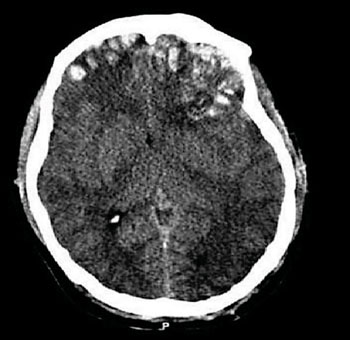Blood Test Detects Traumatic Brain Injury Reducing Unnecessary Imaging
By LabMedica International staff writers
Posted on 03 Jun 2015
A simple blood test to measure brain-specific proteins released after a person suffers a traumatic brain injury (TBI) can reliably predict both evidence of TBI on radiographic imaging and injury severity.Posted on 03 Jun 2015
There is a potential benefit of adding detection of glial fibrillary acidic protein breakdown products (GFAP-BDP) to clinical screening with computed tomography (CT) and magnetic resonance imaging (MRI).

Image: Computed tomography scan (CT) of a patient with brain trauma showing cerebral contusions, hemorrhage within the hemispheres, subdural hematoma, and skull fractures (Photo courtesy of Drs. T. Rehman, R. Ali, I. Tawil, and H. Yonas).
An international team of scientists led by those at University of Pittsburgh Medical Center (PA, USA) analyzed blood levels of GFAP-BDP from patients ages 16 to 93 years treated at multiple trauma centers for suspected TBI. They evaluated the ability of the blood-based biomarker to predict intracranial injury as compared to the findings on an admission CT and a delayed MRI scan. A total of 215 patients were available for analysis and approximately 73% of patients were male.
Serum samples were collected within 24 hours of injury and were dated and time stamped to compare with time of injury. Blinded sample analysis was performed in a single laboratory (Banyan Biomarkers; Alachua, FL, USA) using a sandwich enzyme-linked immunosorbent assay (ELISA) to GFAP-BDP. The GFAP ELISA utilized a proprietary mouse monoclonal antibody for solid-phase immobilization, and a proprietary polyclonal rabbit antibody for detection.
GFAP-BDP level was the most accurate predictor of the presence or absence of intracranial injury detected by radiographic imaging (accuracy, 81%), as compared with accepted clinical predictors of intracranial injury.
The authors reported a net benefit for the use of GFAP-BDP above imaging-based screening alone and a net reduction in unnecessary scans by 12% to 30%. Calculation of a cut-off value to maximize accuracy in the mild and moderate injury range specifically yielded a GFAP-BDP level of 0.6 ng/mL, with a sensitivity of 67%, a specificity of 89%, and a Brier score of 0.21. A cut-off value to maximize specificity was calculated at a GFAP-BDP concentration of 1.66 ng/mL, resulting in a sensitivity of 45%, specificity of 99%, and a Brier score of 0.29.
John T. Povlishock, PhD, a professor at Virginia Commonwealth University (Richmond, VA, USA) said, “Importantly, this study significantly expands upon other studies that speak to the usefulness of GFAP and, specifically, serum-derived GFAP-BDP in identifying those traumatically brain injured patients whose clinical course is complicated by intracranial injury, demonstrating that GFAP-BDP offers good predictive ability, significant discrimination of injury severity, and net benefit in reducing the need for unnecessary scans, all of which have significant implications for the brain-injured patient.” The study was published on April 7, 2015, in the Journal of Neurotrauma.
Related Links:
University of Pittsburgh Medical Center
Banyan Biomarkers
Virginia Commonwealth University













